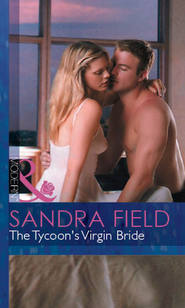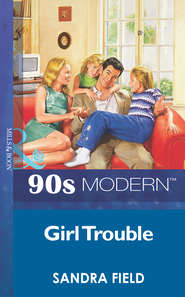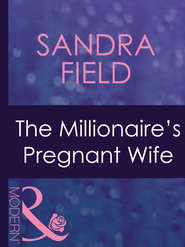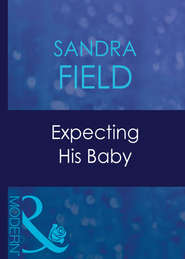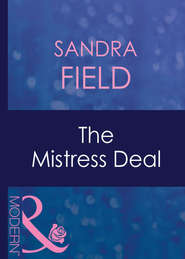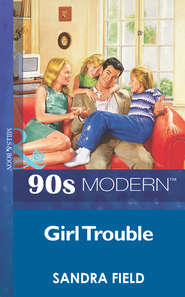По всем вопросам обращайтесь на: info@litportal.ru
(©) 2003-2024.
✖
The Jet-Set Seduction
Автор
Год написания книги
2019
Настройки чтения
Размер шрифта
Высота строк
Поля
Then movement caught his eye. A woman was waving to him. It was Clea, seated on the gold-painted sidesaddle of a high-necked horse, clasping the decorated pole as she went slowly up and down. He waved back, the tension in his shoulders relaxing.
She’d come. The rest was up to him.
The brim of her huge, flower-bedecked sun hat flopped up and down with the horse’s movements. Her legs were bare, pale against her mount’s dark flanks. Bare. Long. Slender.
As the carousel came to a stop, she slid to the floor. She was wearing a wildly flowered skirt that fell in soft folds around her thighs, a clinging top in a green so vivid it hurt his eyes and matching green flat-heeled sandals. The skirt should be banned, Slade thought. Or was he even capable of thought through a surge of lust unlike any he’d ever known?
Clea walked toward Slade, her heart jittering in her chest. He was so overpoweringly male, she thought. Tall, broad-shouldered, long-legged, with an aura of power that she was almost sure he was unaware of, and which in consequence was all the more effective. She came to a halt two feet away from him. “Buon giorno.”
“Come sta?”
“Molto bene, grazie.” She gave him a dazzling smile that reduced his brain to mush. “This is a fun place, Slade, I’m glad you suggested it.”
“Popsicles,” he said firmly, and led her to the little booth decorated with big bunches of rainbow-hued balloons.
She chose grape, he raspberry. Sucking companionably, they wandered in and out of the boutiques and stands, Slade purposely keeping the conversation light. Belle was no fool, and had, in her way, only confirmed his own suspicions: Clea had been badly burned and it behooved him to take it slow.
Slow? When she went back to Europe tomorrow?
Slow. He made frequent trips to Europe.
They watched a very talented mime artist, and a somewhat less talented musician, tossing coins into their hats. Out of the blue Clea said, “Did you enjoy your dinner with Belle?”
“I did, yes. We go back a long way—she’s known my parents for years.”
“Ah yes, your estimable parents.”
“I like my parents and I’m not about to apologize for it,” Slade said, a matching edge to his voice.
“It’s none of my business how you feel about them.”
He reached over and wiped a drop of purple from her mouth with his fingertip. “Why don’t you believe in marital harmony?”
As she bit her lip, it was as much as he could do to keep his hands at his sides. “I told you—I’m a realist. Oh look, what gorgeous earrings.”
She dragged him over to a kiosk selling abalone earrings that shimmered turquoise and pink. Lifting one to her ear, she said, “What do you think?”
“They clash with your sweater. But you could wear anything, and you’d still look devastatingly beautiful.” Anything, he thought. Or nothing.
She laughed. “Oh, you Americans—so direct. The earrings, Slade, the earrings.”
“They match your eyes. Let me buy them for you.”
“So I’ll be indebted?”
“So I’ll have the pleasure of knowing that perhaps, occasionally, you’ll think of me.”
“I promise that perhaps, occasionally, I will,” she said, removing the gold hoops she was wearing and tucking them in her purse. Increasingly, she was finding it difficult not to like Slade. Didn’t that make him all the more of a threat?
“Let me,” Slade said, and with exquisite care inserted the silver hooks into her lobes. Her skin was as smooth as he’d imagined it. Deep within him, desire shuddered into life.
Her irises had darkened, as though a cloud had covered the sea. He stepped back, reaching for his wallet and paying for the earrings. “They look great on you.”
She struggled to find her voice. “Thank you.”
“My pleasure,” he said formally.
Between them, unspoken, crackled the electric awareness of sexual attraction. Slade said abruptly, “You know I want you. You’ve probably known it from the first moment we met.”
“Yes, of course I know—which doesn’t mean we do anything about it…other than enjoy each other’s company on a sunny morning in October.” She fluttered her lashes at him in deliberate parody. “Are you enjoying my company?”
“Very much. Don’t fish, Clea.”
“Where better than on Fisherman’s Wharf?” As he chuckled, she went on calmly, “We’re talking about sex between two total strangers here. Possibility is so often more interesting than actuality, wouldn’t you agree?”
“Not when one of the strangers is you.”
“You have a pretty way with a compliment.”
He said, fixing her with his gaze, “Possibility’s on a par with fantasy. Nothing wrong with fantasy—last night I had a few about you I’d be embarrassed to describe. But actuality is real. Real and risky. That’s the catch, isn’t it?”
She said through gritted teeth, “I don’t sleep with someone I don’t know.”
“That’s easily fixable. We can get to know each other.”
“Slade, I’ve been told I’m beautiful, and I know I’m rich. Consequently I’ve learned to choose my partners carefully. I already told you that you scare me—you’re the last man I’d have an affair with.”
He shouldn’t have been so direct. But he had a horrible sense of time running out, along with the even worse sense that nothing he was saying to her was making any real or lasting impression. Welcome to a new experience, Slade thought wryly. He’d never before had to work at getting a woman interested in him; fighting them off was his area of expertise.
“There’s a bakery a couple of blocks from here that sells crusty sourdough bread,” he said. “I always take some home with me.”
He heard the tiny puff as she let out her breath. “Let’s go,” she said agreeably. “Do you like to cook?”
“I do. Sheer self-defense. I eat out a lot, and it’s relaxing to stay home and cook for myself. My specialties are bouillabaisse and pumpkin pie. I’ll make them for you sometime.”
“Perhaps. Occasionally,” she said, her eyes full of mockery.
“For sure. At least once.”
“You don’t like opposition.”
“Neither, dear Clea, do you.”
She laughed. “Who does? Tell me about sourdough bread—it doesn’t sound very appetizing.”
Impatient of small talk, suddenly desperate for details beyond the superficial, Slade said, “How old are you, Clea?”
“Old enough to enjoy flirtation without—how do you say it?—strings attached.” She stepped off the boardwalk onto the sidewalk at the end of the wharf. “As for—”






